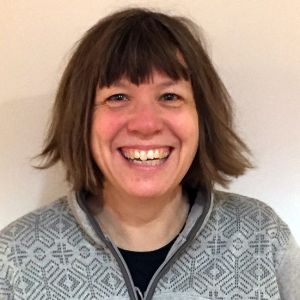On 17 January, the Student Portal was closed down for all students, and all the University’s courses are now on Studium, a virtual learning environment (VLE). Work to transfer courses to the new VLE has been ongoing since the autumn of 2020. Lena Klintberg from the Faculty of Science and Technology has been responsible for coordinating the project and also developed a workshop to introduce Studium to the Faculty’s teaching staff. Despite various challenges including a pandemic, she thinks the transition for teaching staff and administrative officers has gone well.
“We have had our own, dedicated Teknat team who have worked with our teaching staff and processed all the feedback that we have received. At the same time, there  have been a lot of feelers out in the organisation to pick up on all sorts of problems and improvement ideas,” says Lena Klintberg.
have been a lot of feelers out in the organisation to pick up on all sorts of problems and improvement ideas,” says Lena Klintberg.
Wide range of features for the University
Studium is based on Canvas, which is a system used globally. Among the features in use at Uppsala University are the video storage service Studio, a quiz function, and multiple administrative support tools. Other features have been developed by the University’s own team of programmers, including a function to enable reporting of results to Ladok and the creation of various types of lists. Another feature that Lena Klintberg also particularly likes is the function that allows students to share information in file areas.
“Getting the students to work in Studium makes it easier for lecturers to keep track of what is going on compared with alternative forums for these kinds of discussions, such as Facebook groups.”
In your view, which aspects of Studium will require further development?
“Course evaluations, I think – and this is also the priority for our programmers. However, as far as the Faculty of Science and Technology goes, and if I, as a teacher, were to make a wish list, it would be great to have columns for reporting and weighting different course components. When grading, it would also be really useful if it were possible to combine the different weightings of course components using a formula. Some students may have attended the regular seminar, while others may have completed assignments to make up for missing the seminar, and these are aspects we want to include in our grading,” says Lena Klintberg.
“And then there might be even more functions for groups that would make things easier. Especially true if you have very large courses which can become rather unwieldy. I know there is currently work being done on this.”
Guides for doctoral students and programme pages
Joining Lena Klintberg in the Faculty of Science and Technology Studium team was a representative from each department – either teaching staff or one or two administrative officers. One thing they have been working on intensively is the development of a streamlined approach to managing doctoral students, who often enrol in courses alongside their doctoral studies. The team has also pushed for new guides for doctoral students and has provided feedback on existing guides in order to develop Studium’s instructor resources. In addition, the Council for Educational Development at the Faculty of Science and Technology (TUR) has organised a dedicated series of themed seminars and workshops to train teaching staff in how to work with quizzes and videos.
Along with two coordinators from Humanities and Social Sciences, the Faculty of Science and Technology project team has met regularly with the central project team to present their shared ideas and requests.
“Stina Boman, the central project manager, has been the real ‘spider in the web’, and has really done a superb job. Two educational developers have also been involved at the central level, as well as a steering committee. There’s no point pretending that this transition hasn’t be a stress and added pressure for teaching staff given the extra work involved, especially during the pandemic. But I believe the vast majority are satisfied with the outcome, thanks to the multiple layers of support in place.”
Awarded SEK 150,000
A few months ago, the significant effort put in by the Faculty of Science and Technology project team was recognised when they were awarded a grant of just over SEK 150,000 by the NORDTEK network. These funds were originally intended for student and teacher exchanges as part of the Nordic Council of Ministers’ cooperation programme between the Nordic and Baltic countries. However, in light of the current, substantial restrictions on mobility, the Teknat team’s VLEs were seen as particularly valuable in the facilitation of cross-border knowledge sharing. Four other projects from Norway and Lithuania were also awarded funding for their digital activities.
What are you going to do now that the Studium project is over?
“Some of my time will be spent providing support and coordinating issues related to Studium even during 2022 in cooperation with coordinators in the other disciplinary domains at the University.”
